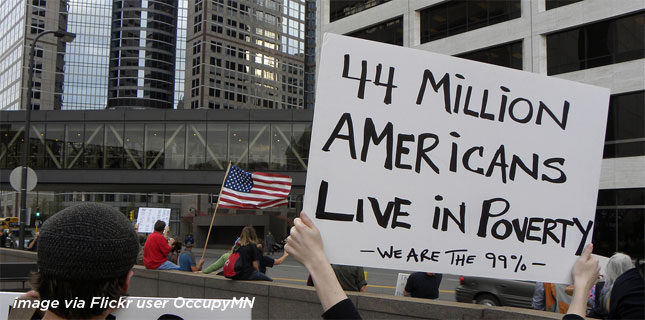
There are several signs that Republicans are increasing their focus on reducing poverty and increasing opportunity as an item on their «To Do» list. For a political party known for its focus on taxes, budget deficits, smaller government, and business, the new focus on the disadvantaged is important news if true. Many liberal pundits like Eugene Robinson of the Washington Post and Robert Kuttner of the American Prospect write disparagingly of interest in the poor shown by prominent Republicans. They state or imply that it’s all for show. But three developments seem to indicate that the Republican interest in poverty and economic opportunity is real and may be growing.
The first is the long-term commitment of Speaker of the House Paul Ryan to drawing the attention and thinking of the Republican Party to developing and implementing conservative ideas for fighting poverty. His year-long tour of poor neighborhoods to meet community leaders and listen to their ideas for fighting poverty, guided by long-time black community activist Bob Woodson, has gotten a lot of media attention. Ryan, however, abjures public attention about his tour and his staff points out that his tour is a natural outgrowth of his being an acolyte of Jack Kemp, a Republican member of congress in the 1970s and 1980s, head of the Department of Housing and Urban Development in the George H.W. Bush administration, and the original compassionate conservative. Some also criticize Ryan for the paradox that at the same time he claims to be interested in helping the poor, he is the author of a budget that cuts many programs for the poor. Nonetheless, he spends time visiting leaders of poor communities around the nation, authorssweeping studies of poverty, offers welfare reform legislation, and proposes to increase a federal wage subsidy for low-income workers without children. Perhaps Ryan and other Republicans think they can save money to pay for new, more conservative programs by cutting some of the existing programs they think induce dependency.
Next, consider Arthur Brooks, the head of the nation’s premier conservative think tank, the American Enterprise Institute. Brooks frequently writes and gives speeches about poverty and opportunity. His view is straightforward and not easily accepted by the left; namely, that the left has not been able to solve poverty and promote opportunity because its agenda features giving money and in-kind benefits such as food to the destitute, thereby increasing their dependency on government. By contrast, at least in Brooks’s view, conservatives want to give the poor more than, as he put it in his recent book The Conservative Heart, «subsistence and dependence.» Brooks, like Ryan, believes that conservative ideas about creating opportunity for all Americans will be more effective than progressive ideas for giving people unearned entitlements.
If the most powerful Republican politician in the nation’s capital and the head of the nation’s leading conservative think tank believe that conservative ideas have a better chance of boosting the poor, what are these ideas? The ideas cluster around four broad topics: promoting economic growth through lower taxes, fewer regulations, and more and higher quality educationso more people can find jobs; promoting married-couple families and reducing the share of children reared by single parents; promoting work, especially by requiring work of able-bodied recipients of government benefits; and greatly improving the education of kids from poor families.
Are Ryan and Brooks on the forefront of a growing conservative movement to make reducing poverty and increasing opportunity a new focus of Republican policy? Anyone attending the recent public forum in Columbia, South Carolina to put the ideas of presidential candidates on poverty and opportunity up for public display, sponsored appropriately enough by the Kemp Foundation run by Jack Kemp’s son, would come away convinced that at least the six Republican candidates who participated in the forum (John Kasich, Marco Rubio, Chris Christie, Jeb Bush, Mike Huckabee, and Ben Carson) had lots of ideas about poverty and opportunity and were noticeably animated in their enthusiasm for conservative solutions and critical of progressive solutions. In addition, Arthur Brooks was a major participant and brought an intellectual sheen about Republican thinking on opportunity to the event. The four portals of conservative thinking about poverty and opportunity – economic development, marriage, work, and education – were the focus of all the Republic policy proposals. The event was widely covered in the media and the coverage was generally favorable.
Four big issues now loom for Republicans. First, can they fashion a specific set of policies that have been shown by experience and evidence to reduce poverty and promote opportunity or at least have a reasonable chance of doing so? Second, can the enthusiasm for conservative solutions and new thinking spread to Republican officials at all levels of government and to conservative thinkers as well? Third, can Republicans resolve the Ryan dilemma of creating new programs for the poor, especially poor children, with their fundamental commitment to smaller government and balanced budgets? And finally, will Republicans fight for legislation that implements their conservative agenda on poverty and opportunity? The jury is still out on all these questions.
Editor’s note: this piece originally appeared in Real Clear Markets.



Expositores: Oscar Vidarte (PUCP) Fernando González Vigil (Universidad del Pacífico) Inscripciones aquí. Leer más
Una retrospectiva para entender los próximos cuatro años. Leer más
En la conferencia se hará una presentación de los temas más relevantes del proceso de negociación se llevó a cabo desde el 2012, así como del acuerdo de paz firmado entre el Gobierno colombiano y la guerrilla de las FARC a finales del 2016. Se analizarán los desafíos y las... Leer más
El Observatorio de las Relaciones Peruano-Norteamericanas (ORPN) de la Universidad del Pacífico es un programa encargado de analizar y difundir información relevante sobre la situación política, económica y social de Estados Unidos y analizar, desde una perspectiva multidisciplinaria, su efecto en las relaciones bilaterales con el Perú.
© 2026 Universidad del Pacífico - Departamento Académico de Humanidades. Todos los derechos reservados.

